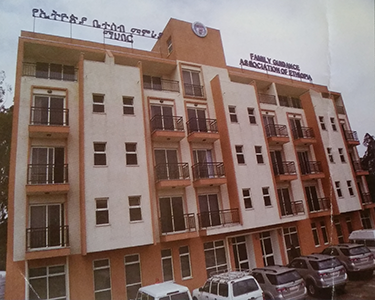Social Franchising Experiential Visit was conducted from April 11-12, 2018
A two days Social Franchising Experiential Visit was conducted from April, 11-12, 2018 by the Delegates of six IPPF visitors: Executive Directors and Program Directors of Burundi and Mali and two IPPFARO staffs. The visit was successfully completed with a lot of shared lessons from the FGAE’s Social Franchise model of service delivery and from each visitor’s experiences as well.
The purpose of the visit was to take lesson with an intention of duplicating FGAE’s Social Franchising model of service delivery programs in the two MA’s: Mali and Brundi. The visit was also anticipated to benefit the two MA’s including FGAE through exchange of ideas, knowledge and good practices. Apart from these, it was able to foster learning among Executive Directors (EDs), Program Directors, two IPPFARO staffs and FGAE staffs regarding programmatic experiences of the respected countries.
The program was deployed through various approaches: power point presentations, site visits, document review with round-table discussions, observation, debriefing sessions and roughly visited HO Gyni & Obs Clinic.
On day one the visitors met some prominent staffs of FGAE at HO and introduced themselves and got to know each other. Then, Ms. Alemitu Seyoum, Acting Clinical Service Director of FGAE, presented a comprehensive presentation on the overall social franchising program instigation, progression and its execution focusing on contents such as social franchising program inception, piloting, scale-up stages and sustainability strategy.

After the presentation the visiting team was gone to Mojo town to Kidist Mariam Clinic which is one of the Social Franchising Clinics based in Mojo town. It was intensely visited by the team with a great support of social franchising experts from HO and CAO. The visit was also extended to Adama town to review documents and to make a cross-check of reporting systems observed during the visiting program like formats, templates, MOU, service registry, monitoring systems and the overall filing system of the program.
 |
 |
On the second day, a remarkable well-coming note was made by Ato Desta Kebede, Program Director of the Association. In his speech, he well-comed the participants and overviewed about the overall social franchising program implementation and related programmatic issues like the implication of the GAG rule and the reversing mechanism taken by FGAE and the speedy positive reaction of key partners, too.
During the reflection session, Mr. Abok was clearly stated behalf of the visitors that each had shown great interest to start social franchising program in their MA and this program was initiated by IPPFARO. In connection with this, he told that the program has achieved its target as both MAs were apparently understood how FGAE decentralized and manage the social franchising program with small cost allocated for each AOs. M’Bo Moussa, ED of AMIPPF was also said that creating a strong partnership with FMOH and public-private sectors is a key building block to commence social franchising program which needs also full attention otherwise it could be cause of program failure.
Lessons drawn by the visitors:
- How FGAE implements social franchising program with a minimal budget and integrated with the budget of exiting programmatic service delivery.
- Building organizational credibility among the community has considered as fundamental groundwork during Social Franchising program.
- Sound social franchising program management, implementation and evaluation system.
Area of Improvements:
- As Social Franchising have two sides: demand and supply side. FGAE is appreciated the supply side but the demand side needs some improvements.
- In case of documentation of supportive supervision: it seems a bit individualized. files and records are only found in CAO but it should be left within the franchisee’ facility as well.
- Supportive supervision should be regularized with a clear plan in such a way that it ensured all facilities are supervised.
At the end of the program Dr. Donavin Uwimana who was delegated to lead the visiting team from IPPFARO conveyed a closing remark. In her speech, she mentioned that all program people in FGAE have mastered the social franchising program even if the two leaders were not presented at the start of the program. She said that through the presentation the visiting team was very much informed the targeted institutions in the Family Health Network Model: how they implement the program by integrating with service delivery, how similar formats and templates could use and how few amount of cost can run social franchising program. Followed by, she appreciated FGAE’s for successfully hosting the program and its staffs at HO and CAO for their meticulous involvement to the betterment of the visiting program and thanked IPPFARO to sponsor the program.
Next to Dr. Donavin, Ato Desta Kebede was also uttered a closing remarks. He aired thankful words for all visiting team members and mostly to IPPFARO for initiating this experiential sharing program; and FGAE for kindly accepted and fruitfully hosted the program as well.
Finally, the program was concluded by offering all necessary documents for each participant with DVD.

